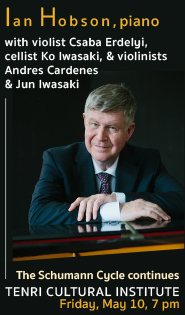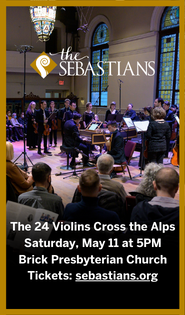Met Chamber Ensemble illumes the essence of Weimar with Hindemith, Weill, Strauss

Remember when classical music used to be fun?
Not that it never is nowadays, but before the rise of mass culture through broadcast radio and television, classical music was an important part of popular entertainment. And not only in concert halls; parks, parades, parlors, and more were all places people could enjoy arrangements of famous short works and excerpts of larger ones.
Monday night’s performance by the Met Orchestra Chamber Ensemble was a throwback to that period—and it was much more. Part of Carnegie Hall’s “Fall of the Weimar Republic” festival, the evening looked back 100 years in a program titled “The Golden Twenties” through music from Paul Hindemith, Kurt Weill, and Johann Strauss II (via Arnold Schoenberg). The ensemble delivered what might be the best distillation of Weimar music culture that will be heard across these next few months. It was great fun, and, in a subtle way it was biting as well.
A particular pleasure of the evening at Weill Recital Hall was hearing Hindemith, whose music has been out of fashion for decades. The ensemble, with conductor J. David Jackson, played Kammermusik No. 1, from 1922. The exuberant energy of the opening fanfare made the composer’s absence from the concert scene a total puzzle, along with the public-facing wit and charm of the entire work. This was a driving performance from the musicians, with a nice swagger and a lovely, near-bereft feeling in the slow Quartett, with sensitive playing from flutist Seth Morris and clarinetist Philip Solomon.
Strauss’s Rosen aus dem Süden waltz followed, in Schoenberg’s arrangement for string quartet, piano, and harmonium. Who doesn’t love a Strauss waltz? That was the point of having this music on the concert—Schoenberg made these arrangements to help support what was for him more serious work—i.e., his Mahler chamber arrangements for his Society for Private Musical Performances. Strauss was there to sell tickets to those Vienna concerts, while last night it was an enjoyable palette-clearer.
It also served as an appetizer for a rarity from Hindemith, and a real treat—the Overture to The Flying Dutchman as played by Bad Spa Orchestra at 7 AM by the Well. The title says a lot about the music, and violinist Jeremias Sergiani-Velázquez said even more to the audience: “You will hear a lot of mistakes and accidents, we want to clarify we will be completely faithful to the score.”
In it, Hindemith eagerly mangles the opening rush of music from The Flying Dutchman, takes apart harmonies and modulations; in the middle a waltz breaks out. Hindemith was triggering a fight-or-flight response in Wagnerians—which at the time and place meant nascent Nazism—and generally skewering the bourgeoisie, using fun to fight for Weimar ideals and aesthetics.
After intermission came the centerpiece of the concert, music from the emblematic work of the Weimar period, Weill’s The Threepenny Opera. With Jackson again leading with spirit and energy to match the music, the ensemble launched into Weill’s suite titled Little Threepenny Music. From the jangly Overture, followed a poignant feeling of poise, pleasure, and not a little regretful nostalgia, as each song was played with wonderful color and style.
In the mind, one sang along with “Die Moritat,” “Polly’s Lied,” “Kanonen-Song,” and it was sheer joy to hear the ensemble playing through the tango and foxtrot rhythms with such savoir fare—as anarchist revolutionary Emma Goldman said, “If I can’t dance, I don’t want to be part of your revolution.” The music is even more satirical than Hindemith, but also extroverted, full of the fun of singing and dancing. The Nazis banning it was the symbolic end of Weimar music, and of Weill’s life in Germany.
The program sequence, strangely, set the anticlimactic Kaiser-Walzer (another Schoenberg arrangement of Strauss) at the end, following a substantial stage change. The way to avoid the obvious letdown was to think of it as an ideal encore, the way for the ensemble to waltz the audience out into the chill of the evening.
The Philadelphia Orchestra with conductor Yannick Nézet-Séguin and the Marcus Roberts Trio play Stravinsky, Weill, and Gershwin, 8 p.m. Tuesday. carnegiehall.org








